
Location: Narooma, VIC
Established: 1980
Architect: John Spencer
First Played: 6th Feb 2011
Last Played: 23rd Dec 2019
Magazine Ratings

85 (Current)

77 (Current)

15 (Current)
In a bid for 2011 to finish playing most of the Top 100 courses in NSW, Narooma Golf Club was next to cross of the list. Packing the family, my wife and two dogs we set off for the long trip south. Narooma is located around 5 hours south of Sydney on the coastline. The first priority was finding a dog friendly place to stay at, which we did at Pub Hill Farm Bed & Breakfast (read side column for more details).
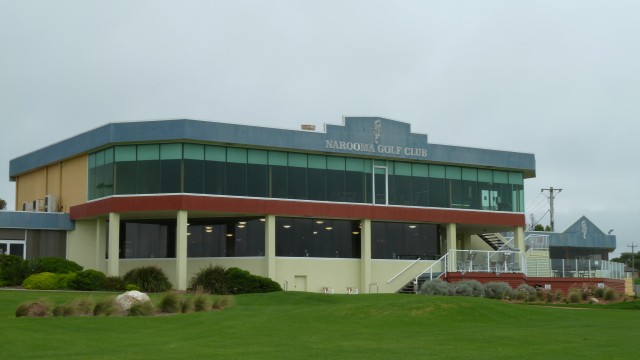
The clubhouse at Narooma Golf Club
Narooma Golf Club started out as a 9 hole course in 1930, providing a community facility to the town. It was not until 1978 that a second nine holes were completed to make a full 18 hole course.
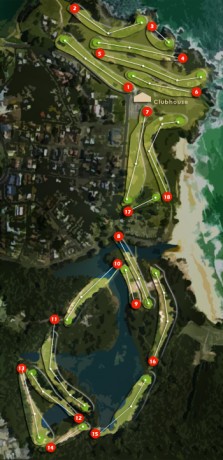
Course map of Narooma Golf Club
This day I was to play alone. The temperature had dropped from 42 degrees the day before to around 18 degrees. On top of that there were light showers and strong winds off the ocean. So of course I was going to play alone, nobody was that keen to put themselves through that. During my morning play I only saw two other groups.
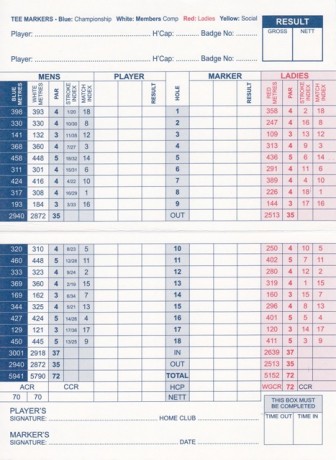
Scorecard for Narooma Golf Club
With this being the case I decided to hire a cart, plus the fact that I had only short sleeve shirt and shorts, the quicker I got around the better, without freezing too much. I have to admit the conditions really suited the situation, what better way to challenge yourself than mother nature trying to assist the course play to its key features.
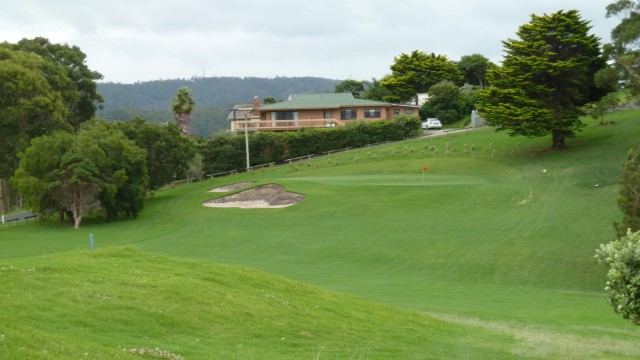
Approach to the 1st green the hardest hole on the course – 393 meter par 4
There were many holes to mention which I truly enjoyed. I think this is the most photos I have put into one of my course reviews, so some I will only give very brief information on. It was also a big struggle to keep the camera dry during the round, so I had a lot of stops to try and remove water from the lens.
The first seven holes can be greatly affected by the winds, as this is a links style layout. Trees are minimal and any wind blowing from the sea will greatly influence ball movement in the air.
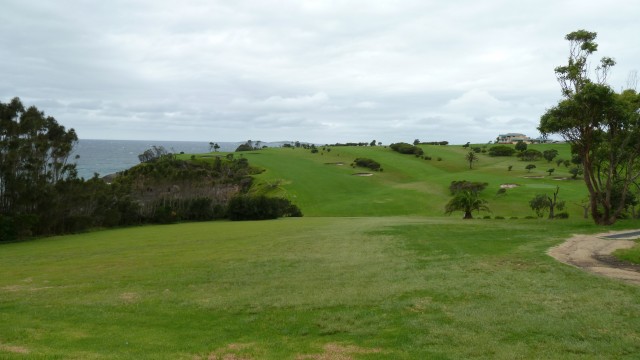
2nd Hole – Hugging the coastline this 330 meter par 4
The second is the first hole to bring the coastal cliffs into play. This 330 meter par 4, dogleg left hole starts from an elevated tee giving spectacular views of the cliffs and coast, also what is in ahead of you to make par. The fairway drops down significantly then rises again to reach the hole. Approaching the green is almost blind due to the rise in the hill. At first glance it looks as if you have to carry some of the cliff drop to make the green. You may have to hit over some but not as much as it appears. With cross winds you will have to be extremely careful, especially if the blow right to left. The green is raised and protected by a sand trap at the front left. If you manage to navigate the second shot without issue par should not be too difficult. The green is fairly flat.
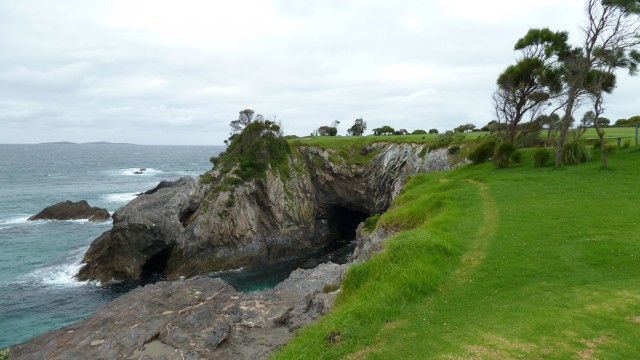
View from the 3rd tee – a shot that is all carry
A challenging par 3, even if the distance is only 132 meters. The third is a tee shot which is all carry over the cliff. The day I played there was at least a three club wind blowing into my face, so it was actually playing 160 meters. After hitting a beautiful tee shot I was almost in horror as I saw the ball fall perilously close to the cliff edge. After taking in a bit more of the scenery and noticing the signs of impeding danger, I approached my ball rather cautiously. It was probably at the limits I would have played it comfortably, I definitely don’t have death wish.
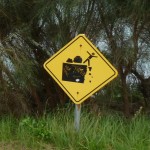
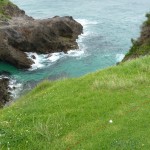
Take heed of the signs – especially if your ball finds a spot like mine did
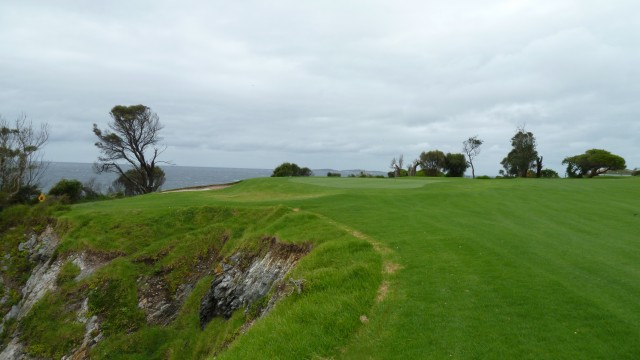
The 3rd green
The green has a sand trap built into the left side, but overall has only slight undulations with a gentle slope back to front. If you can keep the tee shot safe there is a strong chance for par and some bragging rights.
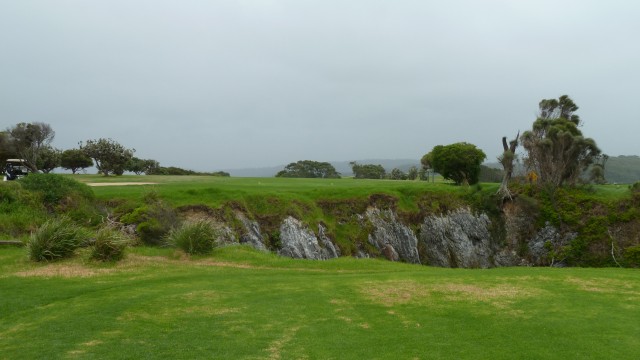
Fourth tee – 360 meter par 4
Hole 4, a 360 meter par 4, has a tee shot which must be played over a chasm. Any mishit and the ball is gone, gone, gone. This should be too difficult, unless you choke, which will see you hitting to a fairway which slopes away. There is a slight dogleg right on this hole, which the longer hitters should reach, but leaving there next shot from a downhill slope.
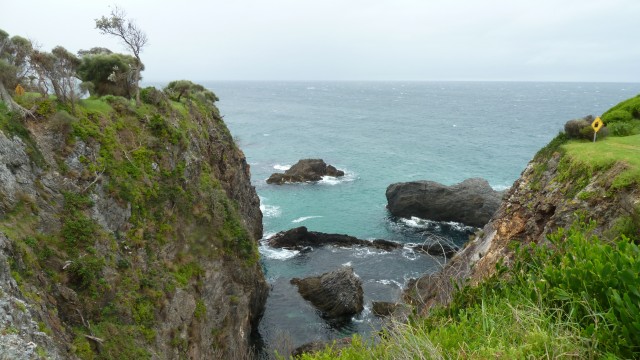
Where your ball will end up if you mishit on the 4th tee
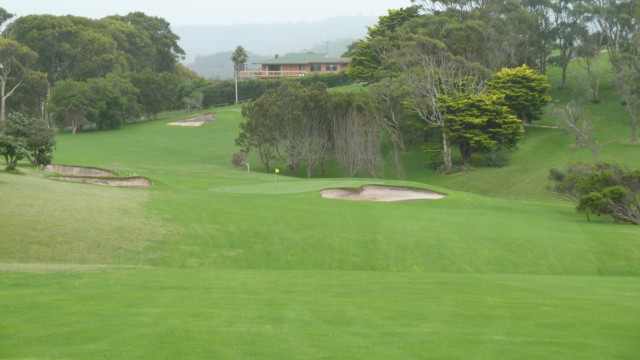
Approach to the 4th green
Approach to the hole is over a gully, with the green built into the slope, but the putting surface is fairly flat. To the left are too large bunkers, with another placed to the right, whilst behind the green is a slope to take any long shots away.


Some of the locals – a magpie not leaving the 5th green, the other just resting on the 6th tee
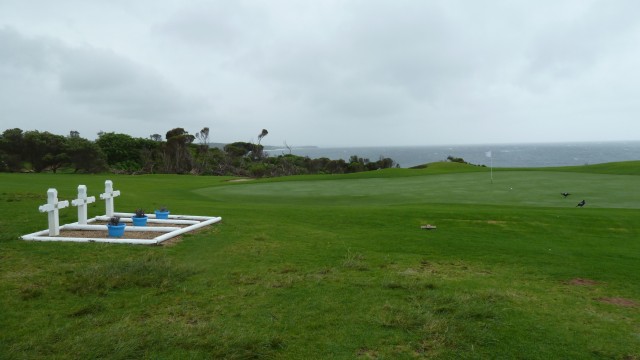
The 5th green – If your not careful near the cliff you could end up here permanently
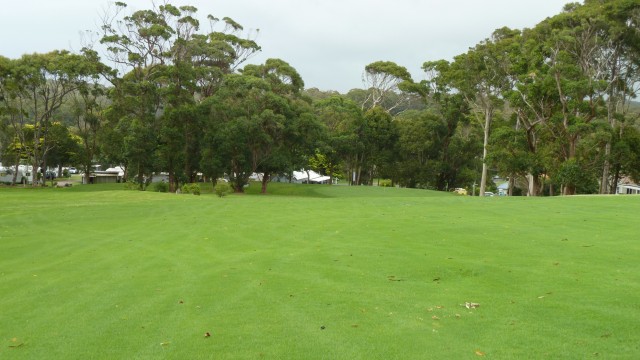
The 7th fairway – playing down hill all the way to the green
Briefly I found the seventh hole, a 416 meter par 4, to be the toughest hole on the course. Hitting into a strong wind, this hole played more like a par 5. Playing down hill into a green which was nestled among the trees.
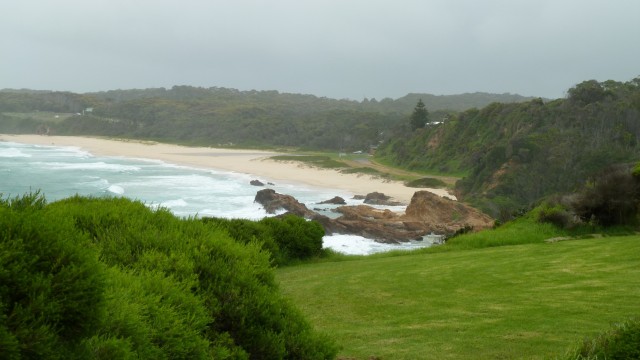
View looking along the beach
Beautiful views of the coast can be seen looking across from the fairway, as you play the ball down a step hill to a green you cannot see. After this hole you are lead to the parkland section of the course.
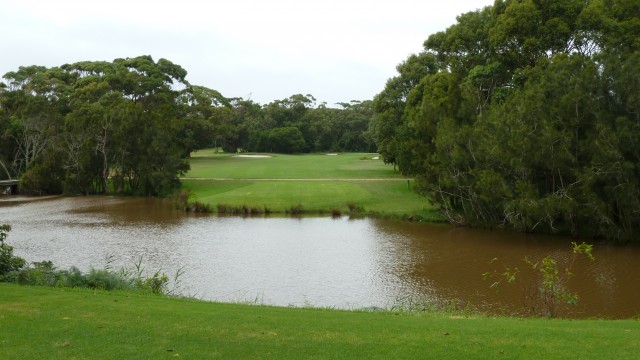
Tee shot from the 8th – 308 meter par 4
The eighth, a 308 meter par 4, is like walking onto a totally different course. Gone are the coastal views, replaced by parkland. Although a short hole, it presents with a tee shot over water and between narrowing trees. Once this is navigated there are two bunkers, either side of the fairway to avoid. Avoid all this, you have a relatively easy approach, with the green protected by one bunker to the left and small swales on the right and rear. The putting surface has a few undulations and general slope from back to front.
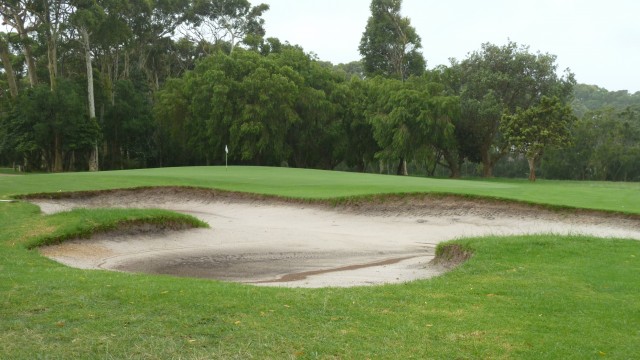
9th green – 184 meter par 3
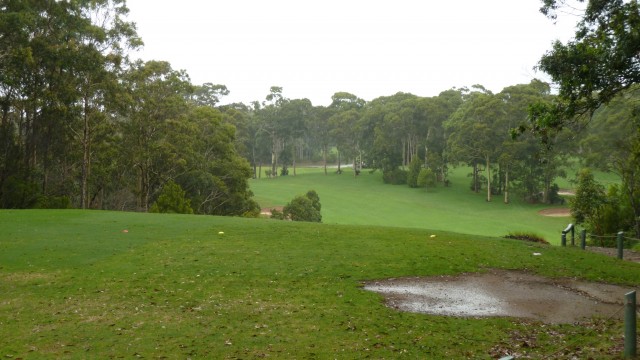
11th tee – almost like hitting off a cliff to this 448 meter par 5
Most of the par 5 holes are in the mid length range, with it being quite possible to reach most in two shots (dependant on wind conditions). Hole 11, a 448 meter par 5, is one of these. Hitting from an elevated tee, if struck in the right direction this hole can be shortened considerably. To the right and left of the fairway is water, followed by bunkers, which are reachable from the tee. Beyond these, the hole takes a sharp turn to the left. If you place the tee shot far enough left without finding trouble, will make the green that much closer.
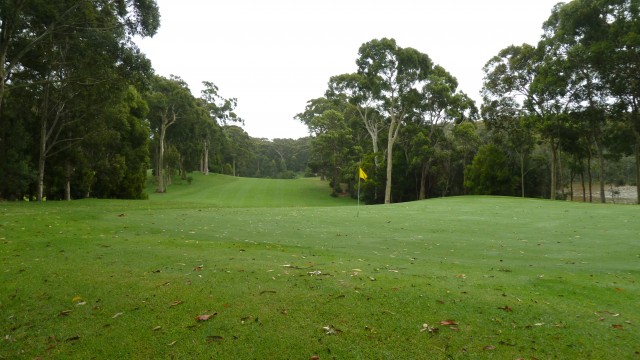
Looking back from the 11th green
Once you reach the fairway the roller coaster ride begins. You have a small hill to hit up, followed by a gully, then rising to the green, which is protected by three bunkers to the left and right. These leave a tight line into the green, if hitting up the middle. There is a few undulations on this green, with predominant slope from back to front.
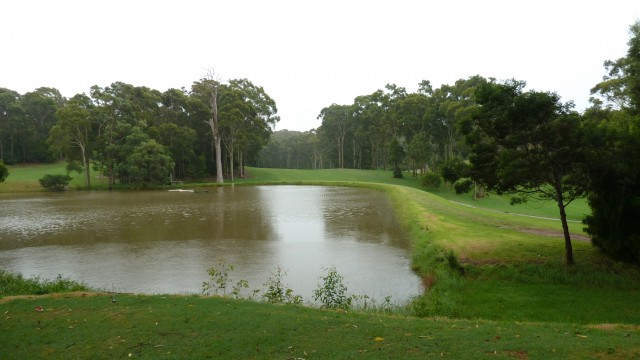
View from the 12th tee – 323 meter par 4
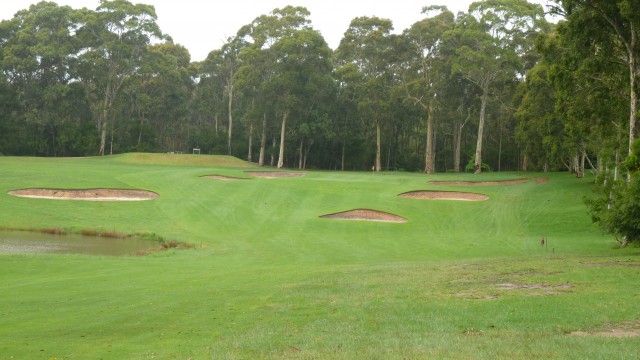
13th green – 360 meter par 4
Hole 13 is very scenic, but I was quite surprised by its index rating of 13. Considering it is a 360 meter par 4 and how the hole is designed it could have been slightly higher. From the tee you are faced with an uphill shot through a chute of trees. If you hit the narrowing fairway the ball will run down the slope on the other side. The edge of a dam is to the left, but only in play for those on that side. The green is at the top of another hill, with three bunkers running up the hill.
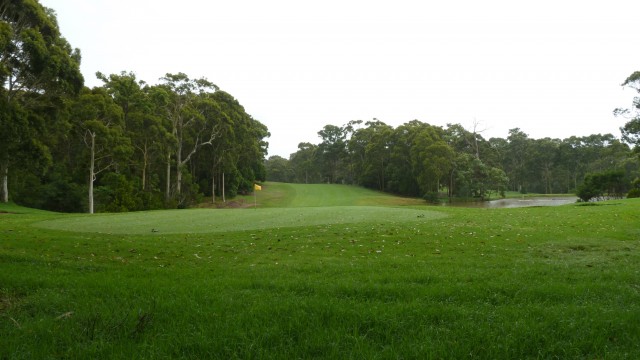
View back from the 13th green
The green itself has more bunkers either side, but the main consideration is the two tiers of the green. Landing on the wrong portion will make par difficult. There is a significant slope separating the two tiers, so dependent upon the pin position, putting could be quite tricky leaving the ball close to the pin.
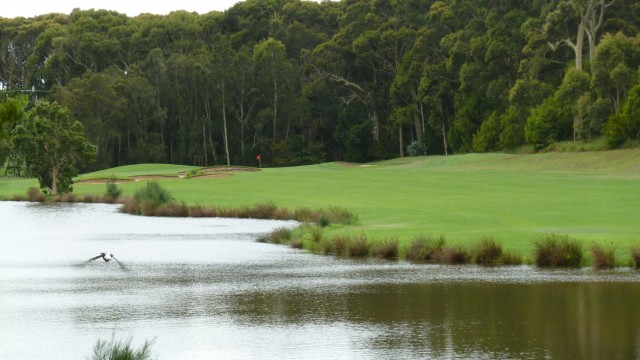
Great scene to hit your tee shot on the 15th – 325 meter par 4
Hole 15 was the risk reward hole on the course, that was visible for a first time visitor anyway. With this 325 meter par 4, your tee shot must carry over water, which then continues on the length of the hole on the left. The fairway angles slightly from the tee. You have the choice of playing safely, putting the ball straight across onto the fairway, or going for broke, flirting with the waters edge as much as possible, to leave a short approach shot to the green. There is plenty of room to hit on the fairway, with only one trap to the right.
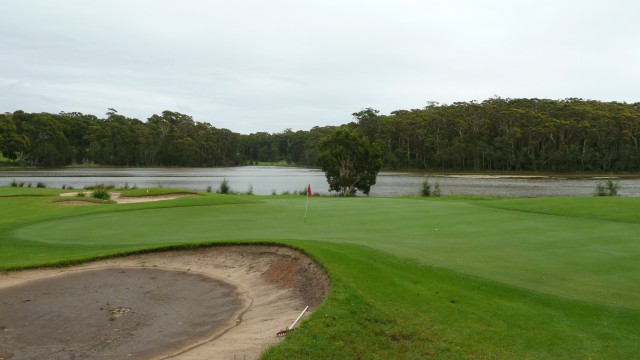
View from the 15th green
Approaching the green, is best done from the right, which potentially removes the large trap on the left from play. The putting surface has some significant undulations, with a spine almost running the entire width in the middle of the green, sloping away from this point to the front and back. Definitely a birdie chance here.
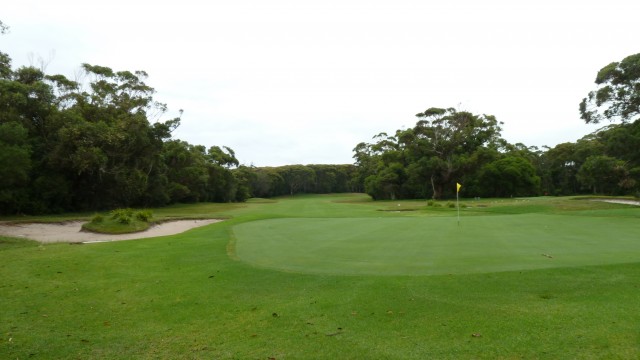
Looking back from the 16th green
The 16th is the last of the holes in the parkland area. This is a 424 meter par 5 which doglegs to the right. Bunkers are found both sides of the dogleg but there is plenty of room to land the drive. The green is protected by a trap on the right but the green is generous letting you attack on your second shot.
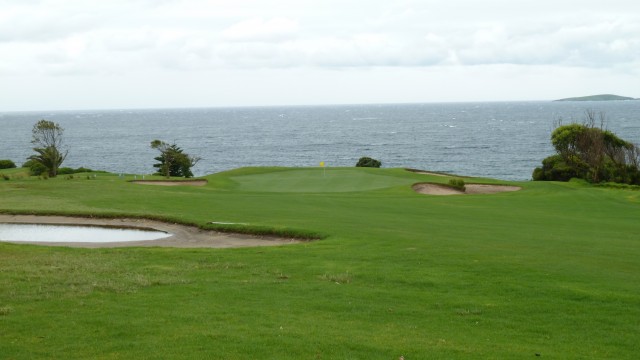
Approach to the 18th green
Finishing the round back near the sea, hole 18 is not overly long for a par 5, measuring at 445 meters. From the tee you have a view behind to the beach, but face the challenge of the hole in the opposite direction, playing the tee shot up a steep hill. This hole takes a severe right turn, from where you play your second. The fairway falls away to a deep gully containing trees. There is the chance to shoot at the green across this gully, although it is a blind shot and the result would not be known until you round the bend. Safety can be found shooting towards the last fairway bunker, leaving a short approach to the green.
If choosing this route, you play down to the green, with the ocean as a backdrop. Three bunkers protect the green, which slopes back to front and left to right. A great, challenging hole to finish the round on.
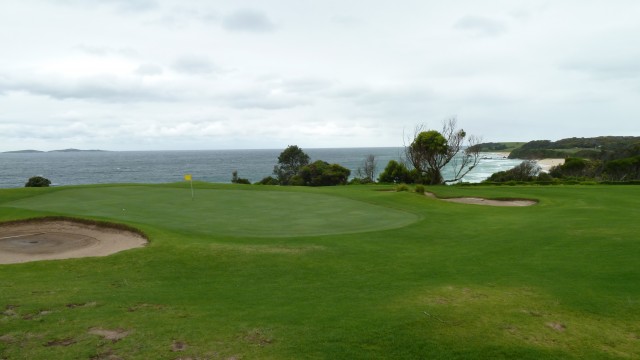
18th green – Great way to finish the round and remember Narooma golf course
Overall I found the condition of the course to be reasonable. Tee boxes were generally in a fair condition, with some having distractions such as fabulous views. The fairways were in good condition on all holes. The rough varied from the Ocean type holes to the Park style holes. Those inland had varying conditions, at times almost being bare.
Greens around the course varied, mostly they were quite soft and receptive of the ball, but some had grass problems whilst the sixth green had a large cut down the middle, which I would assume was due to a pipe replacements as it ran the hole length. The biggest disappointment was the state of the bunkers. The face of all the bunkers on the inland section were bare of sand whilst others looked more like mud baths. I’m not sure if the area has suffered torrential rain in the previous few weeks, but this certainly needs to be addressed.
Putting this aside I would not hesitate to play this course again. It’s great value and up there with some of the more renowned coastal courses.
Narooma Golf Course is open to the public 7 days a week, outside of competition times. This is certainly a must play course for scenery alone.

